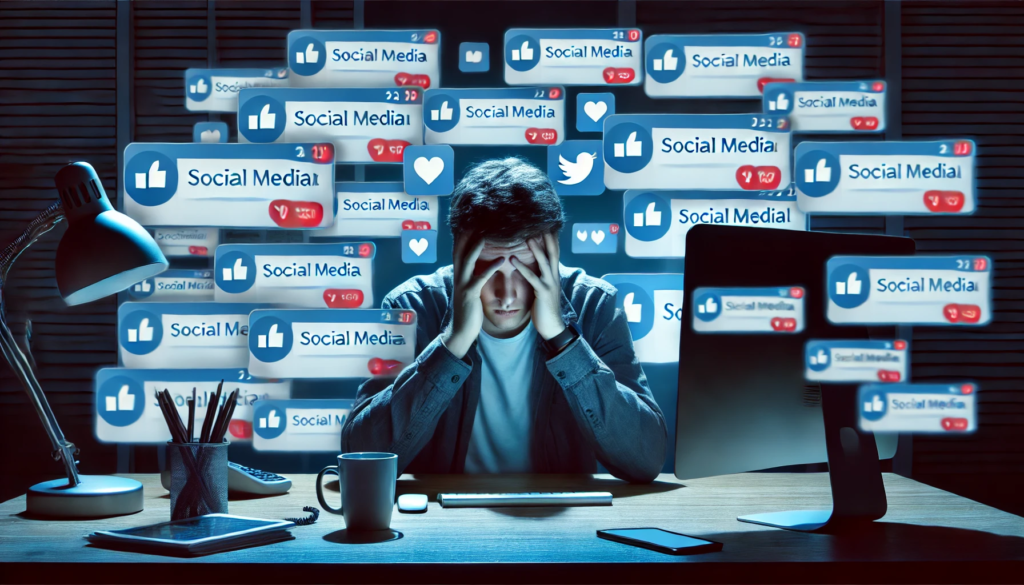Introduction
Social media has become an integral part of modern life. Platforms such as Facebook, Instagram, Twitter, and TikTok provide an avenue for people to connect, share, and express themselves. While social media has numerous benefits, including fostering connections and offering entertainment, it also has significant effects on mental health. The constant exposure to digital interactions can influence self-esteem, anxiety, depression, and overall well-being. This article explores the various ways social media affects mental health and offers insights into mitigating its negative impact.
Positive Effects of Social Media on Mental Health
1. Social Support and Connection
One of the most significant advantages of social media is its ability to connect individuals across the globe. People can maintain relationships with family and friends, find support groups, and engage in online communities that promote mental well-being. Social media platforms allow individuals to share their experiences, seek advice, and receive emotional support during difficult times.
2. Awareness and Education
Social media is a powerful tool for spreading awareness about mental health. Organizations, therapists, and influencers use these platforms to educate people on various psychological issues, coping strategies, and self-care practices. This accessibility to mental health resources has reduced stigma and encouraged more individuals to seek professional help.
3. Opportunities for Self-Expression
Social media allows users to showcase their creativity, thoughts, and opinions. Platforms like YouTube, Instagram, and TikTok provide a space for people to share talents, hobbies, and experiences, boosting self-confidence and fostering a sense of purpose.
Negative Effects of Social Media on Mental Health
1. Increased Anxiety and Depression
Studies suggest a strong link between excessive social media use and mental health issues such as anxiety and depression. The pressure to curate a perfect online presence, fear of missing out (FOMO), and exposure to negative news contribute to increased stress levels and emotional distress.
2. Cyberbullying and Harassment
Online platforms often expose users to cyberbullying and harassment. Negative comments, trolling, and hate speech can have a profound impact on a person’s self-esteem and mental well-being. Victims of cyberbullying may experience anxiety, depression, and, in severe cases, suicidal thoughts.
3. Comparison and Low Self-Esteem
Social media often showcases curated, edited, and idealized versions of people’s lives. Constant exposure to unrealistic beauty standards, luxurious lifestyles, and exaggerated success stories can lead to self-doubt and low self-esteem. Many users compare themselves to influencers and celebrities, resulting in feelings of inadequacy and dissatisfaction with their own lives.
4. Addiction and Reduced Productivity
Social media platforms are designed to be addictive, with endless scrolling features and notifications that keep users engaged for hours. Excessive screen time can lead to procrastination, decreased productivity, and an inability to focus on real-life responsibilities.
5. Sleep Disruptions
Many people use social media late into the night, which negatively affects sleep patterns. The blue light emitted by screens interferes with melatonin production, making it harder to fall asleep. Poor sleep quality can lead to increased stress, irritability, and cognitive difficulties.
Strategies to Manage Social Media Usage for Better Mental Health
1. Set Time Limits
Using features like screen time tracking and app limits can help control excessive social media usage. Setting specific timeframes for social media engagement can reduce its negative impact on mental well-being.
2. Curate Your Feed
Following accounts that promote positivity, mental health awareness, and inspiration can create a healthier social media experience. Unfollowing accounts that trigger stress, comparison, or negative emotions is crucial for maintaining a positive online environment.
3. Take Regular Breaks
Periodic digital detoxes, such as avoiding social media for a day or limiting usage to certain hours, can improve focus and mental clarity. Engaging in offline activities like reading, exercising, or spending time with loved ones can help balance digital consumption.
4. Engage in Real-Life Interactions
Building strong in-person relationships is essential for mental well-being. Prioritizing face-to-face conversations, social gatherings, and outdoor activities can help reduce dependency on social media for emotional fulfillment.
5. Seek Professional Help When Needed
If social media negatively impacts mental health, seeking professional guidance from therapists or counselors can be beneficial. Mental health professionals can provide coping strategies and support to manage stress and emotional distress effectively.
Conclusion
Social media has both positive and negative effects on mental health. While it provides a platform for connection, education, and self-expression, it also poses risks such as anxiety, depression, cyberbullying, and addiction. By adopting healthy social media habits, setting boundaries, and prioritizing real-life interactions, individuals can minimize the adverse effects of social media on their mental well-being. It is essential to use social media mindfully and ensure that it serves as a tool for positivity and personal growth rather than a source of stress and comparison.

